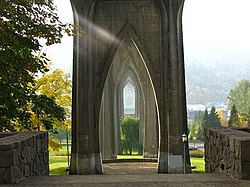Cathedral Park, Portland, Oregon
| Cathedral Park | |
|---|---|
| Neighborhood | |
 |
|
| Coordinates: 45°35′18″N 122°45′29″W / 45.58830°N 122.75799°WCoordinates: 45°35′18″N 122°45′29″W / 45.58830°N 122.75799°W PDF map |
|
| Country | United States |
| State | Oregon |
| City | Portland |
| Government | |
| • Association | Friends of Cathedral Park Neighborhood Association |
| • Coalition | North Portland Neighborhood Services |
| Area | |
| • Total | 1.02 sq mi (2.65 km2) |
| Population (2000) | |
| • Total | 3,033 |
| • Density | 3,000/sq mi (1,100/km2) |
| Housing | |
| • No. of households | 1361 |
| • Occupancy rate | 94% occupied |
| • Owner-occupied | 701 households (52%) |
| • Renting | 660 households (48%) |
| • Avg. household size | 2.23 persons |
Cathedral Park is a neighborhood in the northernmost section of Portland, Oregon on the east shore of the Willamette River. The neighborhood is named after Cathedral Park, which is situated under the St. Johns Bridge, and was given its name due to the Gothic arches that support the bridge, which resemble a cathedral arch.
The St. Johns Bridge connects the neighborhood to the Linnton and Northwest Industrial neighborhoods in Northwest Portland across the Willamette. In addition to these neighborhoods, Cathedral Park is bordered by St. Johns on the northeast and University Park on the southeast.
The 1911 Sanborn Map Index for the City of St. Johns, Oregon shows that the Cathedral Park neighborhood was part of the original City of St. Johns prior to annexation by Portland in 1915.
The neighborhood is named after its most prominent landmark, the city park also called Cathedral Park, which in turn is named after the cathedral-like columns of the St. Johns Bridge it surrounds.
...
Wikipedia

